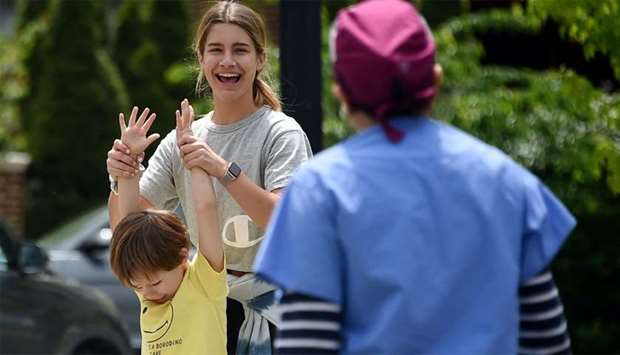The World Health Organisation (WHO) warned on Saturday that recovering from coronavirus might not protect people from reinfection as the death toll from the pandemic approached 200,000 around the globe.
Governments are struggling to limit the economic devastation unleashed by the virus, which has left half of humanity under some form of lockdown and reported infections approaching three million.
The United Nations has joined world leaders to speed up development of a vaccine, but effective treatments for Covid -19, the disease caused by coronavirus, are still far off.
But with signs the disease is peaking in the US and Europe, governments are starting to ease restrictions, weighing the need for economic recovery against cautions that lifting them too soon risks a second wave of infections.
The WHO warned there was still no evidence that people who test positive for the new coronavirus and recover are immunised and protected against reinfection.
The warning came as some governments study measures such as "immunity passports" or documents for those who have recovered as one way to get people back to work after weeks of economic shutdown.
"There is currently no evidence that people who have recovered from #COVID19 and have antibodies are protected from a second infection," WHO said in a statement.
"People who assume that they are immune to a second infection because they have received a positive test result may ignore public health advice," it said.
With more than four billion people still on lockdown or stay-at-home orders, governments are debating how to steadily lift curbs, reopen schools, restart businesses and reboot economies without causing a spike in virus cases.
Some of that discussion centres on new mobile phone apps to alert people to infections, mass antibody testing -- to determine who has had the virus and may be immune -- and the public use of facemasks to stop transmission.
"If I've already had corona then I'm not infectious," said Berlin resident Lothar Kopp, hoping to test positive for antibodies as it could allow him to visit his elderly mother.
Germany has carried out tens of thousands of tests and other countries are also working on determining what may be their so-called level of immunity.
But on Friday, UN Secretary-General Antonio Guterres called for international organisations, world leaders and the private sector to join an unprecedented effort to speed up development and distribution of a vaccine.
"We face a global public enemy like no other," the UN chief told a virtual briefing. "A world free of Covid-19 requires the most massive public health effort in history."
Any vaccine should be safe, affordable and available to all, Guterres said at the meeting, which was attended by the leaders of Germany and France.
Absent though were the leaders of China, where the virus first emerged late last year, and the United States, which has accused the WHO of not warning quickly enough about the original outbreak.
The daily death toll in Western countries seems to be falling, a sign hopeful epidemiologists had been looking for, but the WHO has warned that other nations are still in the early stages of the fight.
Global Covid -19 deaths have climbed past 197,000, but new reported cases appear to have levelled off at about 80,000 a day.
The United States is the hardest-hit country by far in the pandemic, recording more than 51,500 deaths and over 890,000 detected infections.
In a sign of potential risks of reopening, Iranian health officials also raised fears of a "fresh outbreak" with another 76 fatalities declared, bringing Iran's official death toll to 5,650.
Iran has steadily allowed the restarting of businesses that were closed to stop the virus spread. But Alireza Zali, a health coordinator for the capital, criticised "hasty reopenings" that could "create new waves of sickness in Tehran".
The UN push for a quick vaccine came a day after US President Donald Trump prompted outcry and ridicule with his suggestion that disinfectants be used to treat coronavirus patients.
As experts -- and disinfectant manufacturers -- rushed to caution against any such dangerous experiment, the president tried to row back on his comments, saying he had been speaking "sarcastically".
The world's biggest economy has been hammered by the pandemic, with 26 million jobs lost since the crisis began, and US leaders are under pressure to find ways to ease social distancing measures.

